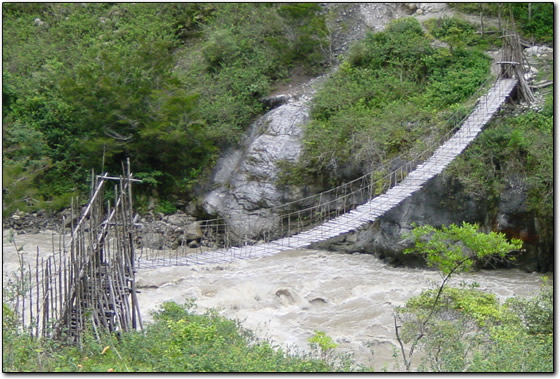
Wet to Wamarek
In the morning it was cloudy. Around the villages, pigs had turned the paths into muddy sties. We climbed over the last stone fence and followed the trail into the forest. The path was full of slippery rocks and wet logs. Arriving at the forested pass we noticed that the soil had turned sandy and that the trees were stunted. The landscape resembled the “kerangas” we had seen in Borneo, a sign that pitcher plants might be at hand! We looked in the undergrowth and bushes, but didn’t see any. Further on, though, we found some “pitchers” that someone had cut and left lying on a flat rock by the side of the trail. After following a sandy stream, the path plunged into a steep valley, then turned to follow a rushing creek in a rocky bed.
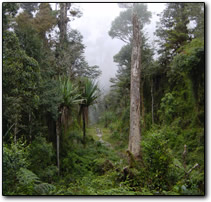 |
 |
At noon we arrived in Wusagalep, our destination for that day. It was too early. Less than four hours of walking was not enough for us, and we didn’t feel like sitting the rest of the afternoon around the campfire, making strained conversation with the adults and entertaining the staring children. We pressed Romy to continue to our next destination, only four or five hours away. It would be hard, but after two days of walking we felt up to the challenge. We continued our descent to the Baliem river, barely visible in the distance. We passed a funeral in progress. The ceremony was already over, but a butchered pig was lying on the ground, ready to be cooked in a grass-lined pit with hot stones. Villagers were busy lining the hole with grass and palm leaves. The hot stones, picked steaming fresh from the fire with improvised wooden tongs and sticks, were thrown into the pit. Men dressed in traditional costume emerged from the honai, one after the other, to shake our hands and welcome us. Making a special exception for the occasion, we handed out sweets and cigarettes, and took pictures. It is hard to avoid playing Santa Claus with people who have so little. But we had seen the effects of too many liberal tourists: children that only know how to beg for sweets and pens and adults who treated us like walking cigarette machines. We only gave gifts when we had a good rapport with the others, usually without them asking, or when there was something to trade, as in exchange for a picture.
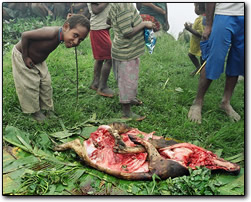 |
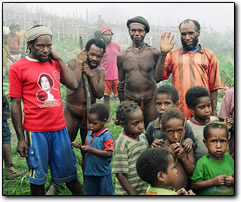 |
It was a long climb down to the Baliem river, where a rickety hanging bridge awaited. The trail was incredibly steep and slippery, in some parts only a narrow track of mud clinging to a grassy incline. While wondering how the Papuans could negotiate such a trail on their bare feet, I wished that my soles had a better grip. Going down was more stressful and tiring than going up! Sometimes we had to grab onto the grass to secure ourselves on the narrow, sloping trail. Finally, we reached the inner gorge. Rock ridges rose into the clouds around us. From a distance, the hanging bridge looked like a pile of weathered sticks. The only foreign elements were the rusty steel cables, anchored with large rocks at either end. In many places the wooden slats had broken, leaving gaping holes that framed the roiling river below. One by one, we crossed the swaying bridge, trying not to look too intensely at the rushing water. Above us, hillsides were scarred where the earth had broken loose and slid down. It was time to climb again, up the steep slopes and across ridges. We agreed to stop at Wamarek, not our final destination, but it was already late and the village was clean, hospitable and had a large, traditional hut set aside for tourists. The owner welcomed us into his kitchen so that we could warm ourselves by the fire and dry off from the rain. It was his son’s birthday, and to celebrate a large pot of rice was cooking on the stove. A small pig would also be slaughtered. Eric watched as they held the pig in the air and fired an arrow into its heart at close range. We asked if they had any fruit trees in the village, and one of the women returned with a whole string-bag full of sweet, juicy tangerines! Romy, though, was not happy with our change of plans. We were also not happy when it turned out that the last day would be merely two hours of walking! He could not think of a new itinerary that would include six “full” days of walking, so we reached a compromise: we would walk all the way back to Wamena, making the total five days, and pay him an extra half-day salary to make up for the change of plans. We were tired of having to constantly supply Romy with cigarettes, matches and even soap. (Anne couldn’t understand why he didn’t bring some from home.) After dinner that night we snacked on “kelapa hutan” (forest coconut), a kind of roasted pandanus seed, as we sat around the campfire.
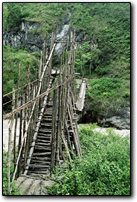 |
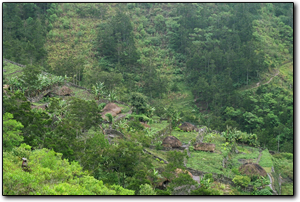 |
